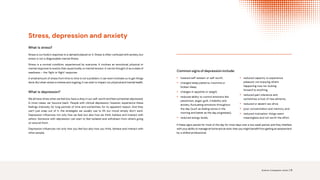This document provides an overview and resources from the Black Dog Institute for creating a mentally healthy workplace. It discusses the prevalence of mental illness in Australian workplaces and the costs to businesses. Some key points made include:
- 1 in 6 Australian workers experience mental illness at any given time and it is a leading cause of absenteeism and reduced work performance.
- Employers can play a role in supporting worker mental health and wellbeing through various programs and initiatives.
- Creating a mentally healthy workplace benefits both employers and employees by increasing productivity and engagement while promoting psychological wellbeing.
- Understanding and reducing stigma is an important first step by educating about the realities of mental illness.




















